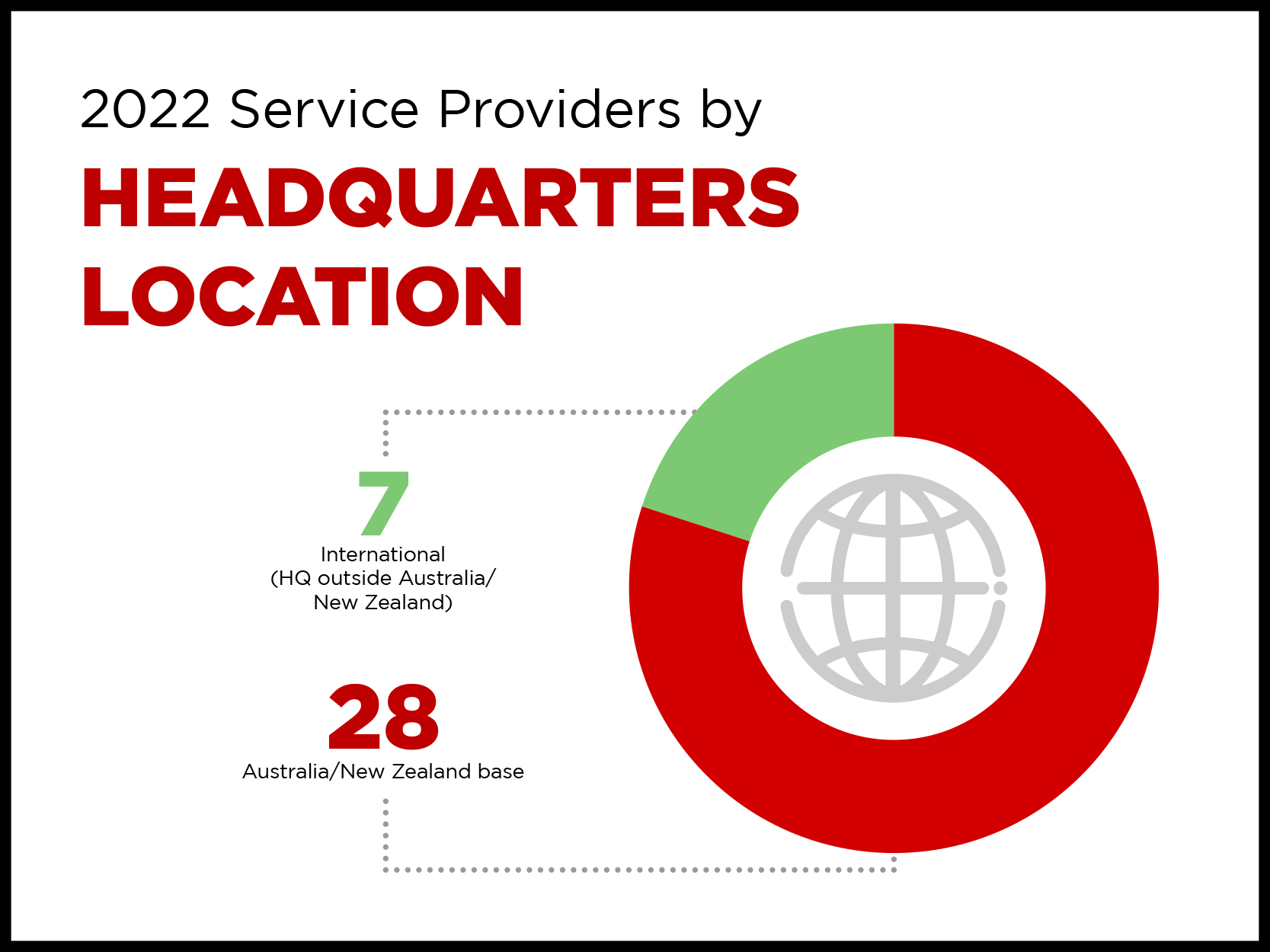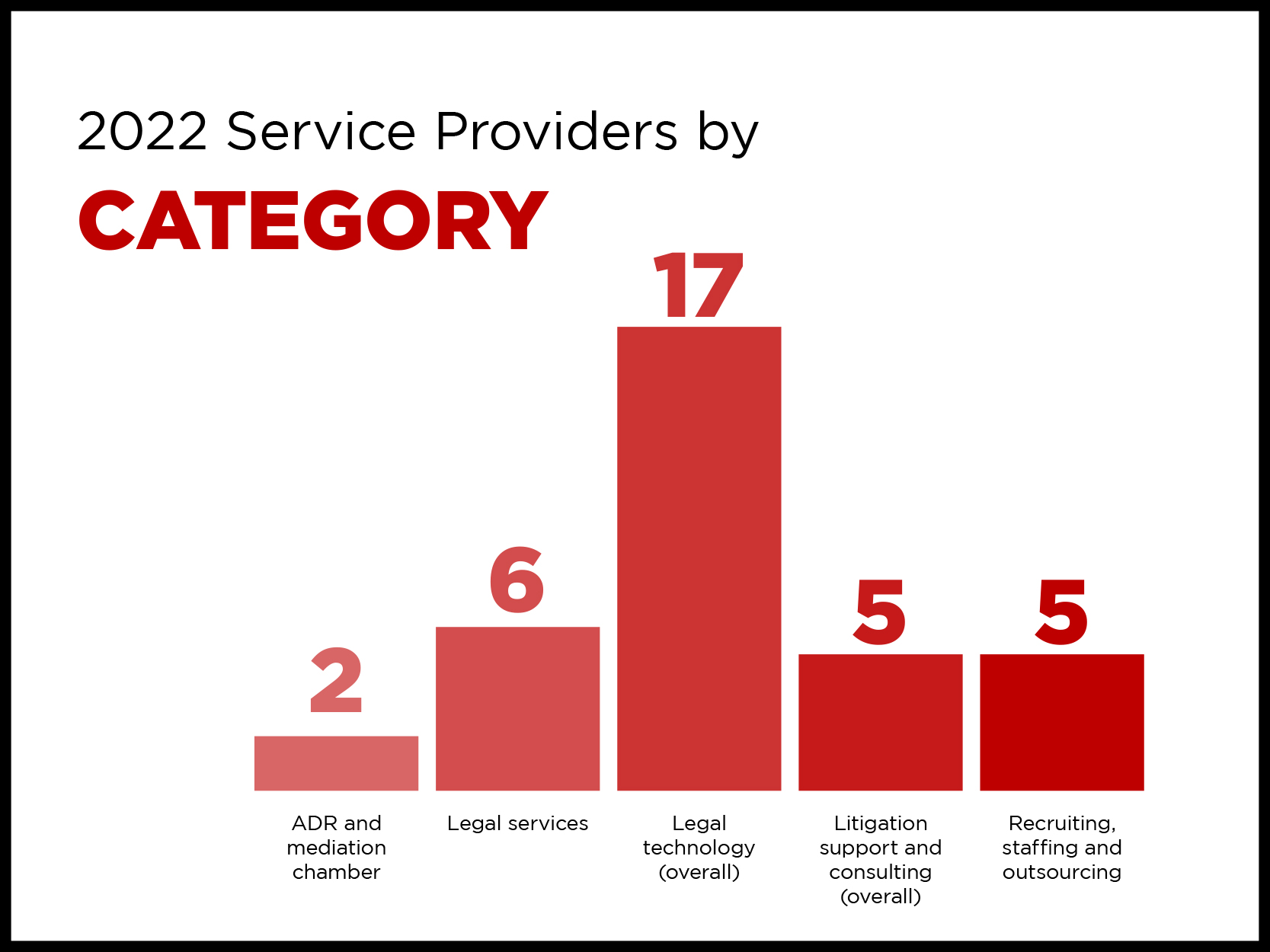

Jump to winners | Jump to methodology
As the COVID-19 pandemic drove people into the safety of their homes, the legal profession had to reinvent the way it operated. Services could no longer be offered manually; thus, automation became critical to the operations of law firms and organisations.
This need for an operational overhaul has resulted in the birth of new legal service providers and a revitalisation of existing ones. Some providers expanded on their available offerings, capitalising on the increased use of Microsoft apps and communications platforms like Zoom. In some cases, lawyers and law firms themselves took their understanding of what people in the profession needed from their service providers and set about meeting those needs themselves.
Service providers that thrived during the pandemic acted quickly in identifying the needs of the market at a specific time and then rolling out the appropriate products and service in response. They were also able to pivot effectively in an environment that has been constantly changing, and have embraced the new standards of working.
“More and more, businesses are requiring a more cash-flow-sensitive approach to legal solutions that are payable in monthly instalments rather than as a lump-sum legal matter”
Justine Zhou and Zile Yu, Quantum Cover

One thing that has traditionally slowed legal work down is the need for lawyers to manually tackle menial tasks. Given the inability to go to the office, digitalisation became key to lawyers still being able to do their work – and eventually to, in some ways, do it better than before.
“I’d always known that legal work could be done a lot better, and that technology could help – I just didn’t know how to do it for most of my career,” says Gene Turner, a corporate and finance lawyer who went on to co-found legaltech company LawHawk. “[My co-founder Allen Li and I] established LawHawk with a singular focus on automating and improving legal processes – creating solutions that we would have used ourselves as lawyers.”
When Turner and Li launched LawHawk in 2015, Turner went on to master legal document automation “to a standard that lawyers within a top-tier firm could use”. Cloud solutions also helped the company develop user-friendly processes for law firms and in-house legal teams.
In the years that followed, the company decided to shift its focus from legal document automation to working with in-house legal departments to optimise organisations’ processes for overall improved outcomes.
“There are a lot of factors making in-house legal teams more interested in legal automation, including an inflationary environment and higher costs of recruiting, training and retaining staff; an increasingly complex regulatory environment that manual processes are not fit for; a need for more timely and accurate data; and a greater understanding of the need for legal teams to support their overall business performance and deliver better outcomes,” Turner explains.
“The inability for non-legal staff and legal staff to meet face-to-face also meant that there was a greater need for legal services to be more readily accessible.”
While Turner and LawHawk got their start even before COVID-19 struck, Quantum Cover was founded by Zile Yu of Quantum Law Group well into the pandemic’s run.
“Quantum Cover was founded in 2021 due to feedback from clients of Quantum Law Group who are seeking an all-encompassing long-term and fixed-fee solution for their businesses where they can set and forget,” say Yu and partner Justine Zhou.
“COVID-19 has changed the business landscape in Australia. We see the pandemic as a ‘crisis-tunity’. More and more, businesses are requiring a more cash-flow-sensitive approach to legal solutions that are payable in monthly instalments rather than as a lump sum legal matter. While this has affected more traditional legal service providers, Quantum Cover was founded because of this opportunity identified from the pandemic.”
Yu and Zhou add that in the ‘new normal’ environment, customers are more cash-flow sensitive and expect “more hands-on legal assistance through a longer time frame and life cycle, rather than ad hoc legal advice for specific matters”.
“Without a clear understanding of the problems they need to solve, [lawyers] don’t know which software to evaluate and how to select the combination that is right for them”
Gene Turner, LawHawk
These days, with the wealth of legal service providers that have sprouted across Australia and New Zealand, it’s been more difficult for lawyers to decide what type of solution they actually need.
“There are so many options that lawyers are getting paralysed in analysis,” Turner says. “Without a clear understanding of the problems they need to solve, they don’t know which software to evaluate and how to select the combination that is right for them.”
However, a number of providers have identified some general needs that many clients would seek to meet, such as products that are integrated with Microsoft and those that factor in the rise of crypto and NFTs.
“Hearings through video conference, filing documents through secure platforms, leveraging AI and analytics for interviews – all of these technologies had been waiting in the wings for many years,” says Tom Balmer, strategic accounts director at e-discovery platform developer TransPerfect Legal Solutions.
Also, one need that has remained consistent is that for human resources, which has seen recruitment firms like Naiman Clarke step up to the plate.
“During the pandemic when active roles were scarce and lawyers were very cautious about moving, we were able to create some creative solutions for clients, which maintained our relationship with them, provided them with the best lawyer in the market for the role, and met their and our commercial objectives,” says Naiman Clarke managing director Elvira Naiman.
“The market post-pandemic is frenetic, and salaries are being pushed up by demand. On the candidate side, we are finding ourselves doing a lot more coaching and ‘career discussions’, for example, in respect of salary reviews. The rate of salary change in the market – not unlike the crazy prices we have seen in the property market – is causing a lot of FOMO [fear of missing out] for candidates, and clients are finding the market moving at a pace they aren’t used to.”
“Necessity is the mother of all creation, and in all likelihood we will never go back to the analogue, pre-COVID legal world”
Tom Balmer, TransPerfect Legal Solutions

Balmer believes the pandemic has highlighted the critical support role legal service providers play in the legal profession.
“Amongst that chaos, legal service providers and legal technologists have been a cornerstone of the resilience of the legal industry. Necessity is the mother of all creation, and in all likelihood we will never go back to the analogue, pre-COVID legal world,” he says.
“Importantly, those ‘frontline’ technologies also rendered other technology acceptable to the archaic tech cynics.”
Barhead Solutions engagement manager Amanda Fajerman says the impact of COVID-19 “forced many legal service providers to reconsider how they provide support to their customers”.
“They were required to rethink their support structures, ways to create accessible knowledge bases for help and FAQs, and ways to deliver training for their software in more creative ways. The use of training videos, for example, saw increased utility, and those legal service providers that were able to go above and beyond for their customers during the pandemic saw increased success,” she says.
The pandemic, Fajerman explains, also changed how teams implemented new software and change management plans.
“The next five years will see the digitalisation of many legal services as teams look to automate processes where rule/condition-based workflows can lend [themselves] to greater efficiencies while maintaining a ‘human in the loop’ for exceptions or quality assurance,” she says.
“There is likely to be consolidation of players across the legal technology market in the coming year, and providers that can surface as holistic, end-to-end platforms are likely to take central stage.”
In February 2022, Australasian Lawyer and NZ Lawyer opened the window to nominations for their first-ever Service Provider Awards, inviting service providers across Australia and New Zealand to put forward their companies for consideration.
The awards spotlight the providers that are delivering the most effective and transformative solutions across areas such as legaltech; legal services; litigation support and consulting; recruiting, staffing and outsourcing; and ADR and mediation.
The editorial and research teams across both publications reviewed the vendors’ submissions, and nominees were evaluated mainly on the strength and process of their service delivery, with the most important factor being how these providers made legal professionals’ lives more efficient through their products and services. The judges also considered the providers’ innovativeness and R&D commitment.
A total of 35 organisations stood out based on these criteria, becoming the 2022 winners of the Australasian Lawyer and NZ Lawyer Service Provider Awards.
80% of winning service providers are based in Australia and/or New Zealand
14 categories and subcategories in which service providers were judged
6 awardees in legal services, the category with the most winners